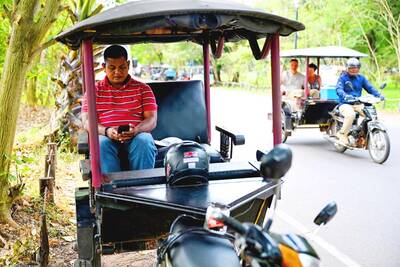Greater access to world markets and more foreign investment is crucial to sustaining democracy in Latin America, foreign ministers from around the region said Tuesday.
In a statement prepared for the closing of the 33rd General Assembly of the Organization of American States (OAS), the ministers vowed to fight poverty and corruption and promote respect for human rights.
US Secretary of State Colin Powell opened the assembly Monday calling on ministers to "hasten the inevitable democratic transition in Cuba."
However, ministers did not even mention Cuba in the assembly's final statement issued after Powell flew to neighboring Argentina early Tuesday.
Democratic rule has spread throughout the continent, the ministers noted, but several countries "have faced serious problems, worsened by poverty" in their efforts to preserve democracy.
They urged a world economic order that promotes growth, open markets for the region's exports and increased investment in the region.
"Support by international financial institutions to democratic governments is also essential and requires the creation of creative financial mechanisms to strengthen democratic governance," the document stated.
The two-day assembly opened the way for a regional treaty against terrorism to become effective next month. Under the Interamerican Convention against Terrorism, countries commit to jointly fighting terrorism by denying asylum to suspects, increasing border controls and fighting money laundering.
Colombia, Venezuela, Cuba and Haiti are the Latin American countries that have the most worrisome records on human rights, said Marta Altolaguirre, president of the Interamerican Human Rights Commission.
In Colombia, Altolaguirre said, a four-decade civil war involving Marxist guerrillas, right-wing paramilitary groups and the Colombian army has resulted in massive abuses against the civilian population.
She blamed most of the abuses on the left-wing Revolutionary Armed Forces of Colombia.

The death of a former head of China’s one-child policy has been met not by tributes, but by castigation of the abandoned policy on social media this week. State media praised Peng Peiyun (彭珮雲), former head of China’s National Family Planning Commission from 1988 to 1998, as “an outstanding leader” in her work related to women and children. The reaction on Chinese social media to Peng’s death in Beijing on Sunday, just shy of her 96th birthday, was less positive. “Those children who were lost, naked, are waiting for you over there” in the afterlife, one person posted on China’s Sina Weibo platform. China’s

‘NO COUNTRY BUMPKIN’: The judge rejected arguments that former prime minister Najib Razak was an unwitting victim, saying Najib took steps to protect his position Imprisoned former Malaysian prime minister Najib Razak was yesterday convicted, following a corruption trial tied to multibillion-dollar looting of the 1Malaysia Development Berhad (1MDB) state investment fund. The nation’s high court found Najib, 72, guilty on four counts of abuse of power and 21 charges of money laundering related to more than US$700 million channeled into his personal bank accounts from the 1MDB fund. Najib denied any wrongdoing, and maintained the funds were a political donation from Saudi Arabia and that he had been misled by rogue financiers led by businessman Low Taek Jho. Low, thought to be the scandal’s mastermind, remains

Australian Prime Minister Anthony Albanese yesterday announced plans for a national bravery award to recognize civilians and first responders who confronted “the worst of evil” during an anti-Semitic terror attack that left 15 dead and has cast a heavy shadow over the nation’s holiday season. Albanese said he plans to establish a special honors system for those who placed themselves in harm’s way to help during the attack on a beachside Hanukkah celebration, like Ahmed al-Ahmed, a Syrian-Australian Muslim who disarmed one of the assailants before being wounded himself. Sajid Akram, who was killed by police during the Dec. 14 attack, and

VISHNU VANDALS: A Cambodian official accused Thailand of destroying a statue in a disputed border area, with video showing the Hindu structure being torn down The Thai military said ceasefire talks with Cambodia, set to begin yesterday, are expected to conclude with a meeting of the countries’ defense ministers on Saturday, as the two sides seek to end weeks of deadly clashes. The talks started at 4pm in Thailand’s Chanthaburi Province, which borders Cambodia. The Thai Ministry of Defense outlined several demands to be discussed ahead of the bilateral meeting of the General Border Committee (GBC) on Saturday. If secretariat-level discussions fail to reach agreement on key technical frameworks such as troop deployments, the Thai side would not proceed with the GBC meeting or sign any agreement on